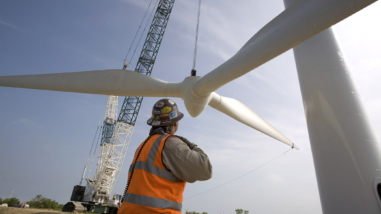The most recent update from the world’s best scientists is out — and they paint a grim picture of a world in dire straits due to looming climate change. To avoid truly catastrophic damages, they conclude that we must act — decisively and with unprecedented scale and urgency.
The newly released report by the Intergovernmental Panel on Climate Change (IPCC), an international body representing 195 countries that was established to assess climate change science, draws its conclusions from an evaluation of more than 6,000 scientific studies and combines the research of thousands of leading scientists and government reviewers from 40 countries. The report makes clear that we are already seeing the effects of climate change in the increased frequency and severity of hurricanes and floods, the destruction of national infrastructure, loss of private property and coastal communities, severe drought and famine, food and crop shortages, coral reef and fisheries collapse, mass wildlife extinctions, pest-borne illness and disease, and more. But the report also makes clear that these damages represent only the first taste of a much more frightening future unless we change how we conduct the business of the global economy.
While we do not have historical examples of the kinds of sustained, global, economy-wide changes that will be needed, we do know what has to be done— and we have examples in a host of different arenas that can help point the way. For example, the price of installing solar energy has fallen by more than 70 percent since 2010 in the United States, and now competes favorably with carbon-based fuels for all new electric capacity. Electric vehicles have been penetrating the market at an extraordinary clip— with China installing as many electric buses every five weeks as the entire fleet in the city of London. Even the cement sector (which is responsible for as much as 8 percent of global CO2 emissions) is being decarbonized— and in some experimental technologies, can even absorb greenhouse gases in its production.
What is needed is no longer primarily a technological breakthrough but a political will to act. Here, too, we have examples of how that can be achieved. At the Global Climate Action Summit held in California in September, Governor Brown signed an executive order committing the state (the world’s fifth largest economy) to total, economy-wide carbon neutrality by 2045— which would be well-aligned with the IPCC’s timetable. He joined a list of other leaders from cities and national governments alike that have committed to the same agenda— from New Zealand to Costa Rica, and from Stockholm, Sweden, to Adelaide, Australia.
Notwithstanding these exemplary efforts, it will indeed be a daunting task to get the world fully on-board with the effort. Commercial interests, concerns over costs of the transition, and inertia in both government and markets will all need to be addressed and overcome. But the science is now out— and it is clear. We need to make rapid and monumental transformations in our economies, governments, and societies, and every half degree of temperature rise that we can stop through urgent policy change will prevent unprecedented suffering.
There is no room for defeatism, delay, or distraction. We must push for bold change and transformation.




